Zhezheng Hao
ReCreate: Reasoning and Creating Domain Agents Driven by Experience
Jan 16, 2026Abstract:Large Language Model agents are reshaping the industrial landscape. However, most practical agents remain human-designed because tasks differ widely, making them labor-intensive to build. This situation poses a central question: can we automatically create and adapt domain agents in the wild? While several recent approaches have sought to automate agent creation, they typically treat agent generation as a black-box procedure and rely solely on final performance metrics to guide the process. Such strategies overlook critical evidence explaining why an agent succeeds or fails, and often require high computational costs. To address these limitations, we propose ReCreate, an experience-driven framework for the automatic creation of domain agents. ReCreate systematically leverages agent interaction histories, which provide rich concrete signals on both the causes of success or failure and the avenues for improvement. Specifically, we introduce an agent-as-optimizer paradigm that effectively learns from experience via three key components: (i) an experience storage and retrieval mechanism for on-demand inspection; (ii) a reasoning-creating synergy pipeline that maps execution experience into scaffold edits; and (iii) hierarchical updates that abstract instance-level details into reusable domain patterns. In experiments across diverse domains, ReCreate consistently outperforms human-designed agents and existing automated agent generation methods, even when starting from minimal seed scaffolds.
Uncertainty-Aware Graph Structure Learning
Feb 19, 2025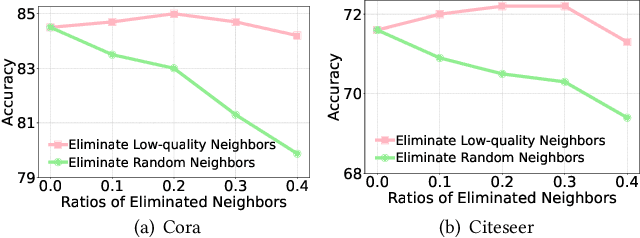
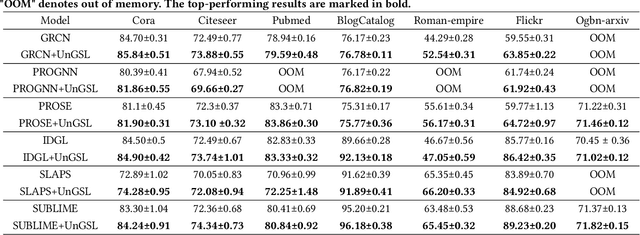
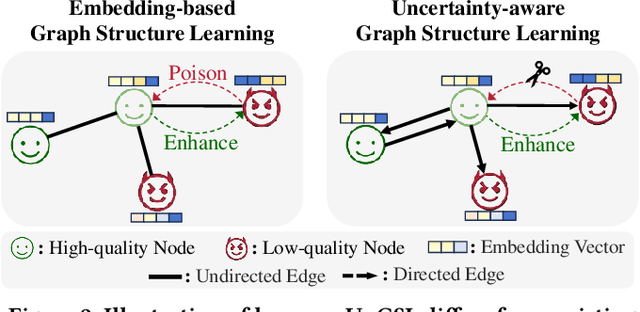
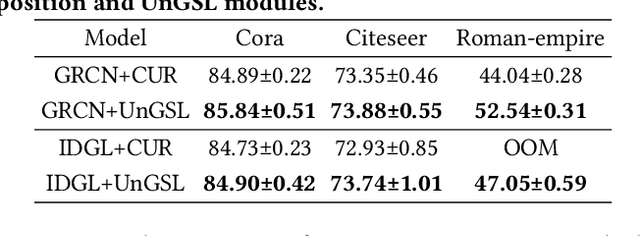
Abstract:Graph Neural Networks (GNNs) have become a prominent approach for learning from graph-structured data. However, their effectiveness can be significantly compromised when the graph structure is suboptimal. To address this issue, Graph Structure Learning (GSL) has emerged as a promising technique that refines node connections adaptively. Nevertheless, we identify two key limitations in existing GSL methods: 1) Most methods primarily focus on node similarity to construct relationships, while overlooking the quality of node information. Blindly connecting low-quality nodes and aggregating their ambiguous information can degrade the performance of other nodes. 2) The constructed graph structures are often constrained to be symmetric, which may limit the model's flexibility and effectiveness. To overcome these limitations, we propose an Uncertainty-aware Graph Structure Learning (UnGSL) strategy. UnGSL estimates the uncertainty of node information and utilizes it to adjust the strength of directional connections, where the influence of nodes with high uncertainty is adaptively reduced. Importantly, UnGSL serves as a plug-in module that can be seamlessly integrated into existing GSL methods with minimal additional computational cost. In our experiments, we implement UnGSL into six representative GSL methods, demonstrating consistent performance improvements.
Acceleration Algorithms in GNNs: A Survey
May 07, 2024


Abstract:Graph Neural Networks (GNNs) have demonstrated effectiveness in various graph-based tasks. However, their inefficiency in training and inference presents challenges for scaling up to real-world and large-scale graph applications. To address the critical challenges, a range of algorithms have been proposed to accelerate training and inference of GNNs, attracting increasing attention from the research community. In this paper, we present a systematic review of acceleration algorithms in GNNs, which can be categorized into three main topics based on their purpose: training acceleration, inference acceleration, and execution acceleration. Specifically, we summarize and categorize the existing approaches for each main topic, and provide detailed characterizations of the approaches within each category. Additionally, we review several libraries related to acceleration algorithms in GNNs and discuss our Scalable Graph Learning (SGL) library. Finally, we propose promising directions for future research. A complete summary is presented in our GitHub repository: https://github.com/PKU-DAIR/SGL/blob/main/Awsome-GNN-Acceleration.md.
Multi-class Support Vector Machine with Maximizing Minimum Margin
Dec 15, 2023

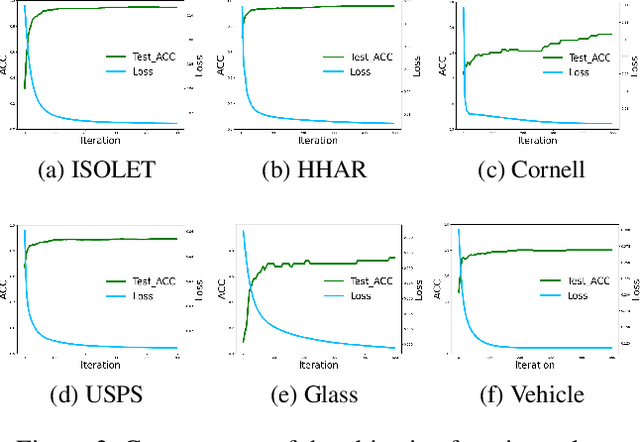
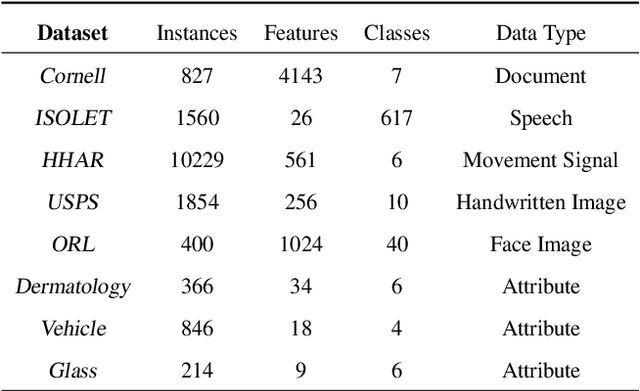
Abstract:Support Vector Machine (SVM) stands out as a prominent machine learning technique widely applied in practical pattern recognition tasks. It achieves binary classification by maximizing the "margin", which represents the minimum distance between instances and the decision boundary. Although many efforts have been dedicated to expanding SVM for multi-class case through strategies such as one versus one and one versus the rest, satisfactory solutions remain to be developed. In this paper, we propose a novel method for multi-class SVM that incorporates pairwise class loss considerations and maximizes the minimum margin. Adhering to this concept, we embrace a new formulation that imparts heightened flexibility to multi-class SVM. Furthermore, the correlations between the proposed method and multiple forms of multi-class SVM are analyzed. The proposed regularizer, akin to the concept of "margin", can serve as a seamless enhancement over the softmax in deep learning, providing guidance for network parameter learning. Empirical evaluations demonstrate the effectiveness and superiority of our proposed method over existing multi-classification methods.Code is available at https://github.com/zz-haooo/M3SVM.
 Add to Chrome
Add to Chrome Add to Firefox
Add to Firefox Add to Edge
Add to Edge